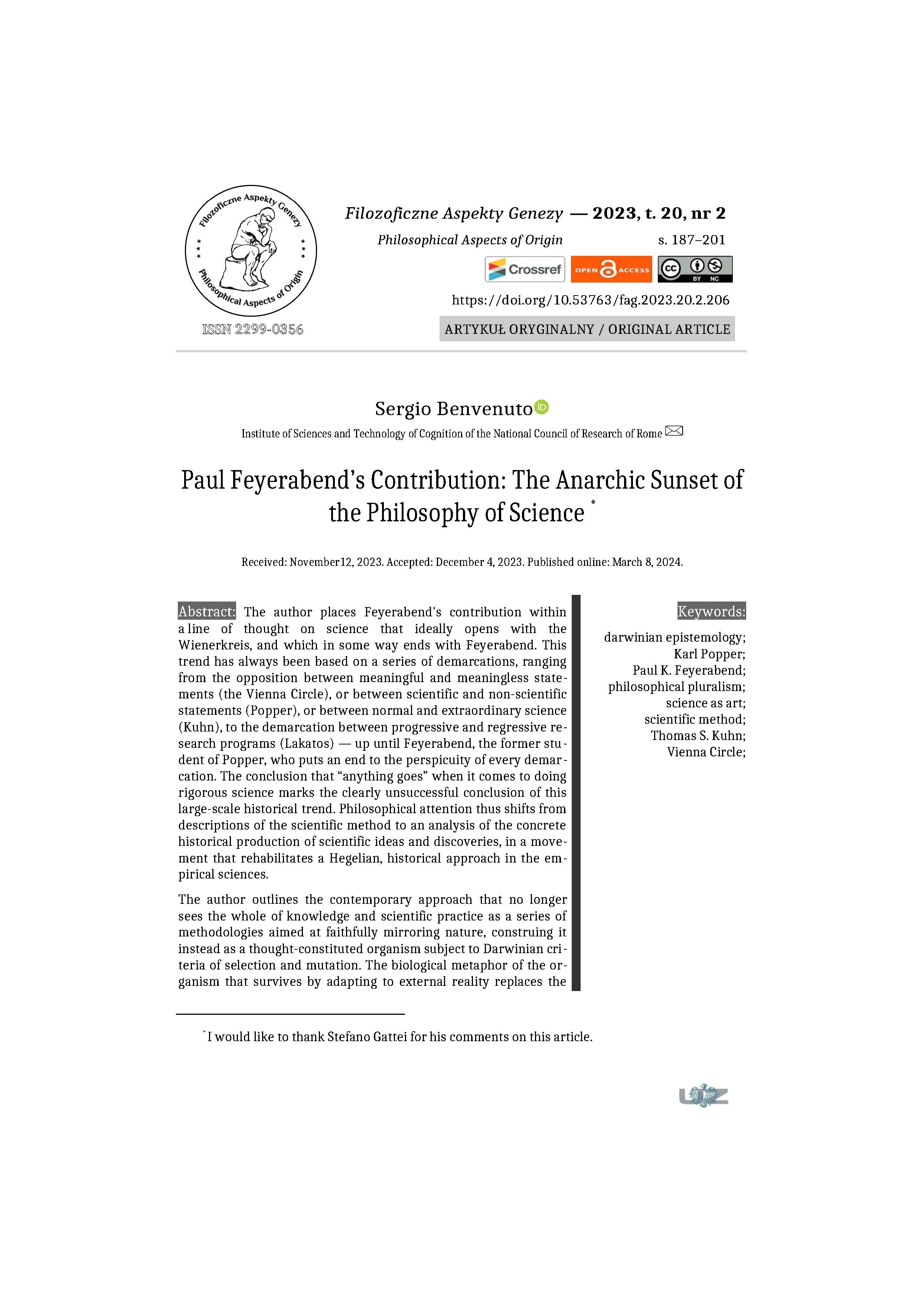
Opublikowane 08.03.2024 — zaktualizowane 28.05.2024
Wersje
- 28.05.2024 - (3)
- 08.03.2024 - (2)
Słowa kluczowe
- darwinian epistemology,
- Karl Popper,
- Paul K. Feyerabend,
- philosophical pluralism,
- science as art
- scientific method,
- Thomas S. Kuhn,
- Vienna Circle ...More
Prawa autorskie (c) 2023 Filozoficzne Aspekty Genezy

Utwór dostępny jest na licencji Creative Commons Uznanie autorstwa – Użycie niekomercyjne 4.0 Międzynarodowe.
Jak cytować
Abstrakt
Abstract: The author places Feyerabend's contribution within a line of thought on science that ideally opens with the Wienerkreis, and which in some way ends with Feyerabend. This trend has always been based on a series of demarcations, ranging from the opposition between meaningful and meaningless statements (the Vienna Circle), or between scientific and non-scientific statements (Popper), or between normal and extraordinary science (Kuhn), to the demarcation between progressive and regressive research programs (Lakatos) — up until Feyerabend, the former student of Popper, who puts an end to the perspicuity of every demarcation. The conclusion that “anything goes” when it comes to doing rigorous science marks the clearly unsuccessful conclusion of this large-scale historical trend. Philosophical attention thus shifts from descriptions of the scientific method to an analysis of the concrete historical production of scientific ideas and discoveries, in a movement that rehabilitates a Hegelian, historical approach in the empirical sciences.
The author outlines the contemporary approach that no longer sees the whole of knowledge and scientific practice as a series of methodologies aimed at faithfully mirroring nature, construing it instead as a thought-constituted organism subject to Darwinian criteria of selection and mutation. The biological metaphor of the organism that survives by adapting to external reality replaces the claim to foundational scientific validity on the basis of a priori paradigms.
Downloads
Bibliografia
- Benvenuto Sergio, Paul K. Feyerabend (1924–1994) ― Search for Abundance, Télos 1995, Vol. 107, Winter 1995, pp. 107–114, https://doi.org/10.3817/1295102107.
- Benvenuto Sergio, Incommensurability and Relativism. A Discussion about Paul Feyerabend's Thought, (F)luxury 2016, https://tiny.pl/cs1l7 [12.10.2023].
- Dawkins Richard, The Selfish Gene, Oxford University Press, Oxford 1976.
- Eldredge Niles and Gould Stephen J., Punctuated Equilibria: an Alternative to Phyletic Gradualism, in: Thomas J. M. Schopf (ed.), Models in Paleobiology, Freeman, San Francisco 1972, pp. 82–115.
- Feyerabend Paul K., Wissenschaft als Kunst, Suhrkamp, Berlin 1984.
- Feyerabend Paul K., Against Method. Third Editon, Verso, London and New York 1993.
- Feyerabend Paul K., Conquest of Abundance: A Tale of Abstraction Versus the Richness of Being, Bert Terpstra (ed.), University of Chicago Press, Chicago 1999.
- Feyerabend Paul K., Against Method: Outline of an Anarchistic Theory of Knowledge, preface by Ian Hacking, 4th edition, Verso, London 2010.
- Fodor Jerry and Piattelli-Palmarini Massimo, What Darwin Got Wrong, Picador, London 2011.
- Hacking Ian, Why Does Language Matter to Philosophy?, Cambridge University Press, Cambridge 1975.
- Hacking Ian (ed.), Scientific Revolutions, Oxford Readings in Philosophy, Oxford University Press, Oxford 1981.
- Panofsky Erwin, Galileo as a Critic of the Arts, Springer, New York 1954.
- Pievani Telmo, Imperfection: A Natural History, The MIT Press, Boston 2022.
- Planck Max K., Scientific Autobiography and Other Papers, Philosophical Library, New York 1950.
- Rorty Richard, Philosophy and the Mirror of Nature, Princeton University Press, Princeton 1979.


